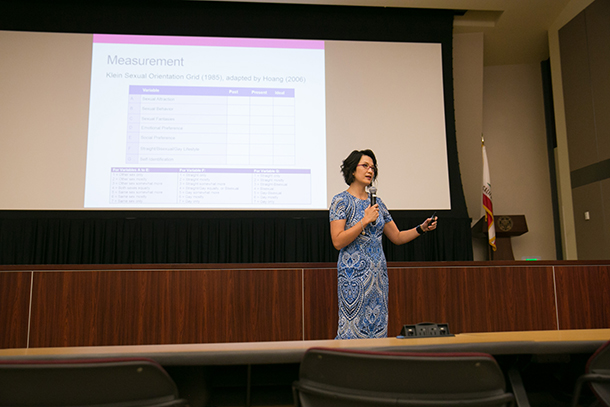Noted psychologist, educator and advocate Mimi Hoang, PhD, spoke on the importance of creating a positive, accepting environment for bisexual patients in clinical practice and everyday life before a capacity crowd recently on the Health Sciences Campus.
Using historical information, statistics, research and her own experience as a bisexual clinician and LGBTQ community leader, Hoang, a professor of clinical psychology at Antioch University Los Angeles and staff psychologist at Loyola Marymount University, led the audience through some of the obstacles that bisexual people face.
The Sept. 13 event was the latest installment in the Diversity Seminar Series, presented by the Keck School of Medicine of USC’s Office of Diversity and Inclusion.
Hoang listed common misconceptions, including that bisexuality equals polyamory or promiscuity; that bisexuality is just a phase; and that bisexual people don’t maintain their orientation when in a monogamous relationship. She likened bisexuality to being ambidextrous.
“Just because you are using your right hand or your left hand,” she began, “doesn’t mean that you don’t have that internal capability to use either hand.”
Hoang also shared some serious health care issues that the bisexual community may encounter, such as higher rates of anxiety and mood disorders, and higher occurrences of binge drinking and smoking. According to many studies, she said, bisexual women in particular tend to experience higher rates of depression, eating disorders and suicidal ideation than straight or gay women or men.
In fact, the most basic health care communication can be challenging: More than a third of bisexual people do not disclose their orientation to their physician, out of fear of facing bias, erasure and discrimination. Clinicians, she said, must be aware of their how their practice can be influenced by their personal experience.
“You need to have awareness about your own identity, and your own assumptions and biases. Is it your assumption that everyone who walks through your door is straight? Or your assumption that they will tell you?” she asked. “Because if you ask them, you’re letting them know that you care and that you are comfortable talking about that topic.”
Hoang concluded her lecture with comments on how to be inclusive and not marginalize bisexual patients.
“Your job is beyond just numbers and diagnosing,” she said. “Your job is also about compassion, humanity and understanding diverse issues and communities.”
— Amanda Busick


